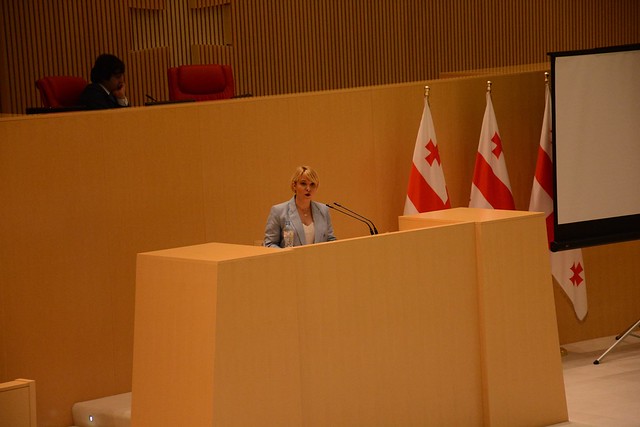MPs Listen to Public Defender's Annual Report at Parliament’s Plenary Session
The Public Defender of Georgia assessed the situation of human rights and freedoms in the country in 2017 at the plenary session of the Parliament of Georgia on July 19, 2018. The Public Defender talked about the main tendencies in the country in terms of human rights protection and deficiencies in the legislation and practice.
"We can all see that the state's response to human rights violations is not effective in some cases and the society is demanding more. The recent crises proved the necessity for institutional reforms in the direction of justice, education, law enforcement, etc. Global changes are the biggest challenge in the protection of human rights. We solve small problems, we change certain legislative norms, but we cannot achieve significant results," the Public Defender said.
Nino Lomjaria discussed the right to life as the first topic. She noted that the state is obliged to carry out an effective investigation into the case of Temirlan Machalikashvili, who was killed in the special operation in the Pankisi Gorge, in order to answer all questions of the society.
As for the murder of teenagers on Khorava Street, the Public Defender named several factors causing incomplete justice - faulty reform of the Prosecutor's Office, lack of an independent investigative mechanism and deficiencies in the judicial system.
Nino Lomjaria stressed the necessity of eliminating informal ruling among prisoners.
The Public Defender also evaluated the situation in psychiatric institutions and demanded mobilization of financial resources for the development of the mentioned field. She spoke about the reasonability of the amendments to the Code of Administrative Offences; unsuccessfully strict drug policy; high death rate in the workplace and the necessity for tightening up the legislation in the field of labour; a lot of shortcomings in the realization of the right to live in a healthy environment. She especially stressed the air pollution problem and noted that the protection of the right to health was hampered by the low quality of healthcare services and ineffective response to the alleged violations of the right of health. According to the Public Defender, the main social program - providing allowance for the population below the poverty line – is faulty, while the realization of the right to adequate food and housing is restricted by limited budget and infrastructural resources, along with the faulty legislative base.
In order to ensure freedom of information, it is necessary to improve the existing legislation and harmonize it with international standards; the legislative safeguards for the protection of cultural heritage monuments are still defective.
In order to restore the rights of conflict-affected population, it is necessary to strengthen support to students, teachers and medical personnel in the occupied territories, and facilitate the use of the referral program.
Nino Lomjaria talked about the necessity of introducing an approach based on the needs of internally displaced persons and refugees, as well as the threat of counter migration of eco-migrants. It is still problematic that relevant agencies do not properly substantiate refusal of granting applications for citizenship or residence permits, or applications of asylum seekers and internationally protected persons.
Poverty and inadequate living conditions of children are still major problems in the country. Even the incomplete number of children receiving allowances is alarming - 150 186. It should be emphasized that 11% of children involved in state care were separated from their biological families due to poor living conditions and poverty. School infrastructure and sanitary-hygienic situation remain problematic.
No effective mechanism has been established for the implementation of the UN Convention on the Rights of Persons with Disabilities. It is not possible to realize various rights of persons with disabilities; the number of employed persons with disabilities is insignificant; the number of children with disabilities remaining beyond formal education and their needs are unknown.
The scale of violence against women and domestic violence is alarmingand the Public Defender hopes that the Parliament will support the initiative of the Ministry of Internal Affairs, according to which, a gender-based murder should be considered as a murder committed under aggravating circumstances.
The study of discrimination-related cases showed that women, persons with disabilities, LGBT community and religious minorities remain among the most vulnerable groups. The cases of alleged discrimination are most often reported in pre-contractual and labour relations.
The Public Defender briefly reviewed the problems faced by religious and national minorities. She noted that social services and adequate housing are not available for a large part of elderly people; targeted programs are also insufficient.
At the end of her speech, the Public Defender proposed each Member of Parliament to choose at least one recommendation according to his/her priorities and monitor its implementation by using legislative mechanisms, or initiating amendments or political discussions.
The Public Defender considers that individual support of MPs will significantly increase the success of human rights protection.
After the delivery of the report, the Public Defender answered the MPs’ questions.
At the end, the Parliament approved the draft resolution on the implementation of the Public Defender's report, submitted by Sopio Kiladze, Chairwoman of the Committee on Human Rights and Civil Integration. The resolution includes 229 out of 303 recommendations of the Public Defender of Georgia.
















